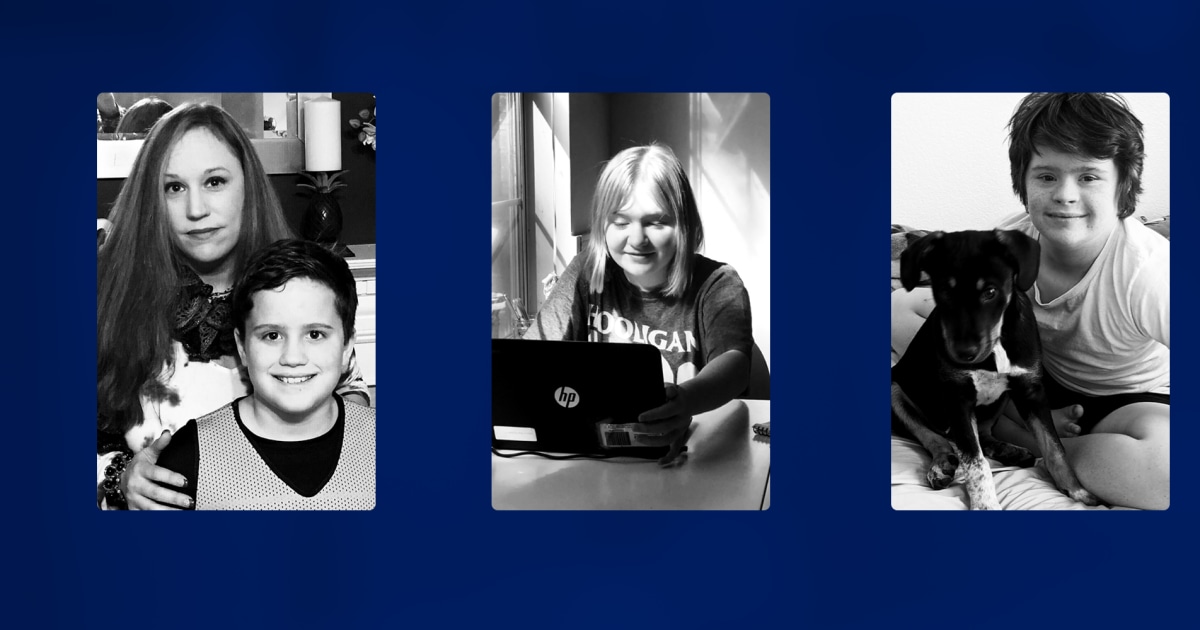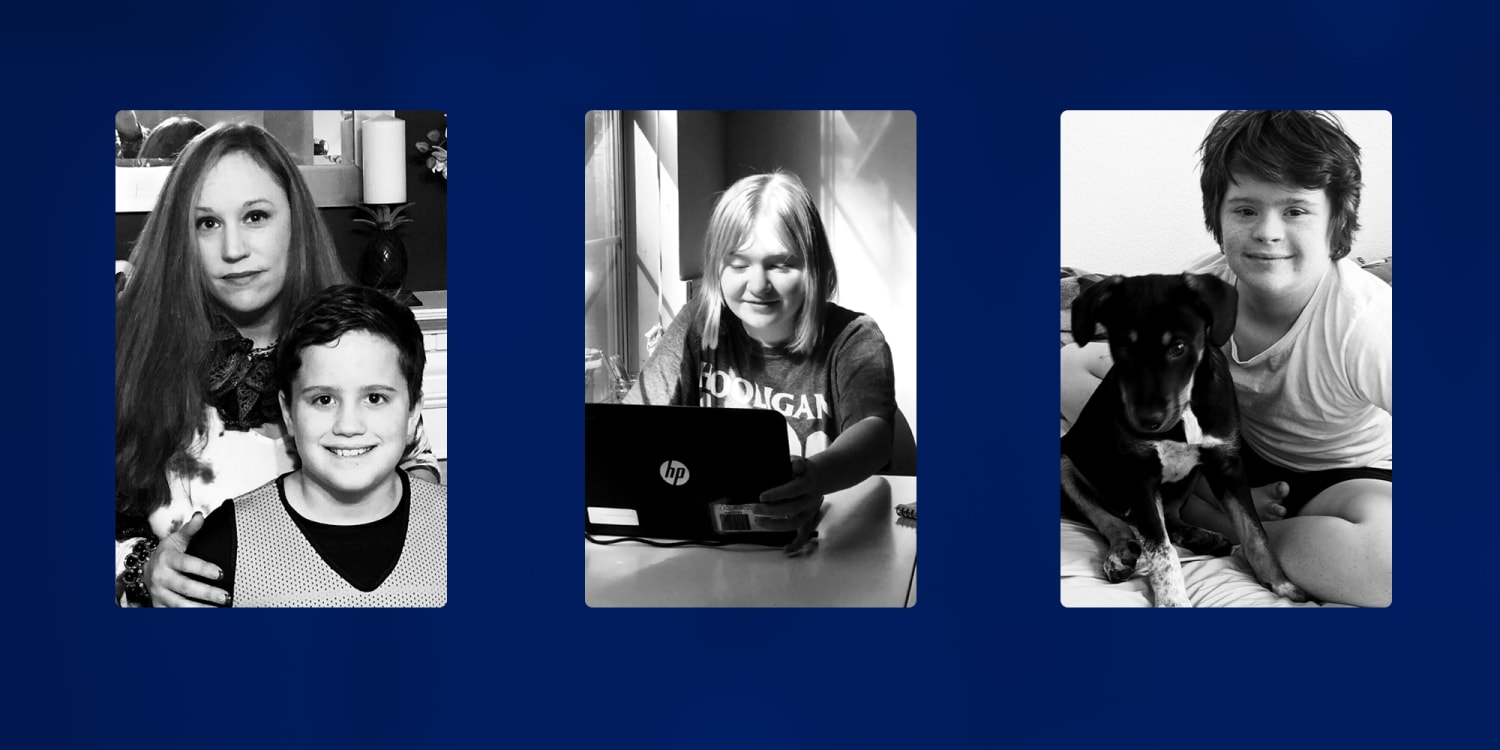
They’re caught in a Covid-19 catch-22.
Karen Woodall is desperate to get Liam, her disabled son who is in the seventh grade, back into his North Carolina school because he can’t learn on the computer and, as a result, has lost a full year of schooling.
Piedmont Middle School in Union County said it’s ready to work one on one with Liam, 12, who has a severe form of asthma, but his doctor won’t allow him to go back to class before he is vaccinated, “because with his health issues Covid could kill him,” Woodall said.
And the state of North Carolina isn’t booking vaccination appointments for anybody under 16.
“I am so frustrated with all of this,” said Woodall, 42, of Monroe. “I’m a nurse, so I’ve tried to go that route to get him vaccinated but haven’t had any luck. I tried through my primary care physicians to get Liam moved up. But no. So now I’m getting ready to start contacting my legislators, writing to Congress. I’m not even sure who I can go to after that.”
The last time Liam was in a classroom was in March, “and he has had no instruction since then,” Woodall said. She said Liam also has attention deficit hyperactivity disorder and a sensory disorder that makes him unable to learn through online classes.
“We had a meeting recently,” she said. “His only option was learning online. But he just can’t learn on the computer. He just can’t. So now they’re sending paper packets, and that’s no good, either. He needs one-on-one instruction.”
Tahira Stalberte, a spokeswoman for the Union County Public Schools, said the school system has been trying to remove roadblocks and make things safe for students who want to return to the classroom.
“Absolutely not,” Stalberte said when asked whether students are required to be vaccinated if they want to attend class.
“We’ve had in-person classes since August, with the option of virtual learning,” Stalberte said. “In fact, our teachers are just getting vaccinated starting today.”
It wasn’t immediately clear how many parents are in the same boat as Woodall, stuck at the end of the vaccination line with no hope of getting their disabled children shots any time soon. The American Association of People with Disabilities, an advocacy group, and the National Association of Special Education Teachers didn’t immediately respond to requests for comment.
Dr. John Torres, NBC News’ medical correspondent, said his heart goes out to those families, but he cautioned against rushing the process.
“I fully get these parents’ wanting to get the kids vaccinated, and in a perfect world that would happen,” Torres said. “But the thing they beat into our heads in medical school is that children are not small adults. What we don’t yet know is what dosing level is safe and effective. Without the human trials to measure the safety and efficacy of the vaccinations on children, we can’t take the risk.”
Dr. Sadiya Khan, an epidemiologist at the Northwestern University Feinberg School of Medicine, said parents of children who aren’t disabled and don’t have underlying health problems shouldn’t wait on vaccinations before sending their kids back to school.
“There is no reason that we need to keep kids out of school waiting for a vaccine,” Khan said. “It seems highly unlikely that vaccine data will be available until 2022, and we cannot keep kids out of school until then.”
Once all the adults are vaccinated, “it is increasingly unlikely that there will be outbreaks,” she said.
“It has already been demonstrated that kids do not drive in-school transmission,” Khan said. “The pandemic has hurt our youth in unbelievable ways directly and indirectly, and prolonging time out of in-person school is adding to that burden.”
Still, parents like Sarah Lundin-Erickson of Charlotte, North Carolina, said being able to vaccinate her 14-year-old daughter, Oona, would make the decision to return her to school so much easier.
Oona, along with her father, has the Factor V Leiden gene, which increases her chances of developing abnormal blood clots in her legs or lungs, said Lundin-Erickson, 47. And people with severe cases of Covid-19 are susceptible to developing blood clots in their legs and lungs.
“I’m just going to keep her in virtual academy as long as I can,” Lundin-Erickson said. “And even in the fall I would wait if she didn’t have the vaccine. … I’d rather be safe than sorry.”
People ages 16 to 64 “with underlying conditions” are in the third phase of the federal Centers for Disease Control and Prevention guidelines for who should be vaccinated first. Risk-free teens and children aren’t even mentioned.
In fact, Dr. Anthony Fauci, director of the National Institute of Allergy and Infectious Diseases, has said elementary school children aren’t likely to be vaccinated until next year.
Christina Eisert, whose 13-year-old son, Ansel, has Down syndrome along with heart and respiratory problems, said that they moved to Colorado in September and that “he has never actually been to his school.”
But Eisert, an adjunct professor at the University of Colorado, said she doesn’t dare send Ansel to school, because he’s at high risk of dying from Covid-19. She said his doctors have cited the CDC guidelines as the reason they have repeatedly refused to bend the rules to vaccinate her son.
“But that’s why I feel like it’s important to kind of rethink some of these rules for kids who are at very high risk,” said Eisert, 47. “My son has underlying issues. He is the definition of underlying issues.”
Another reason doctors are reluctant to give coronavirus vaccine shots to children is that there’s been very little vaccine testing on children.
As is common with vaccine testing, the initial clinical trials of the coronavirus vaccines were limited to adults.
Pfizer and BioNTech, which in December became the first drug manufacturers to get the green light from the Food and Drug Administration, started testing their vaccine on children as young as 12 in the fall.
Moderna started testing its vaccine on children in December. And just this month, AstraZeneca announced plans to begin testing its vaccine on children as young as 6 in three British cities. The drug manufacturers Johnson & Johnson and Novavax have yet to announce any clinical vaccine trials for children.
Still, the early data look promising, Dr. Robert Frenck, who worked on the Pfizer trials at Cincinnati Children’s Hospital, said Thursday on NBC’s “TODAY.”
“The adverse events have basically been the same” in children and adults, Frenck said. “I don’t have all the data from all the [trial] sites to be able to flat-out say, but I have not seen that the kids are getting any different of a safety response.”
Parents with disabled children, like Eisert, said it’s cruel to make them wait until next year to get their shots.
“You know, I understand that this is sort of the perfect storm,” she said. “But I just feel like if I don’t advocate for my son, nobody will.”
Source: | This article originally belongs to Nbcnews.com










